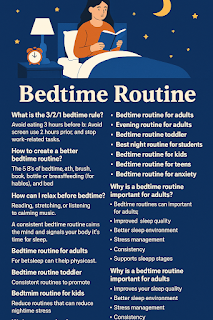Introduction:
Do you wake up feeling tired even after a long sleep? Poor sleep quality affects your mood, energy, focus, and overall health. The good news is, you don’t always need sleeping pills. There are natural ways to improve sleep quality that are safe, effective, and easy to adopt in your daily routine.
Maintain a Consistent Sleep Schedule
Your body has a natural clock called the circadian rhythm. Going to bed and waking up at the same time every day helps regulate this clock, making sleep deeper and waking up easier.
🔹 Tip: Even on weekends, stick to your sleep schedule within 30 minutes difference.
Drink Herbal Teas
Certain herbal teas like chamomile, lavender, and valerian root have natural relaxing properties that prepare your mind and body for restful sleep.
🔹 Tip: Drink a warm cup of chamomile tea 30-45 minutes before bed.
Avoid Caffeine in the Evening
Coffee, tea, chocolate, and cola contain caffeine, which can stay in your system for 6-8 hours, keeping you alert when you need to sleep.
🔹 Tip: Switch to herbal teas or warm milk after 4 pm.
Limit Screen Time Before Bed
Blue light from phones, tablets, and TVs suppresses melatonin, the sleep hormone, making it harder to fall asleep.
🔹 Tip: Switch off devices at least 1 hour before bedtime. Read a book or meditate instead.
Practice Evening Relaxation Techniques
Stress and anxiety are major sleep disruptors. Calming your mind before bed improves sleep quality.
🔹 Try:
🔸Deep breathing exercises
🔸Gentle yoga stretches
🔸Guided sleep meditation
Create a Sleep-Friendly Environment
Your bedroom should feel like a sleep sanctuary.
🔹 Tips:
⭐Keep it cool (around 18-20°C)
⭐Use blackout curtains to block light
⭐Reduce noise using earplugs or white noise machines
⭐Keep your bed clean and comfortable
Get Sunlight Exposure During the Day
Natural sunlight boosts serotonin levels, which regulate sleep-wake cycles and help produce melatonin at night.
🔹 Tip: Spend at least 30 minutes outside every morning or early afternoon.
Exercise Regularly
Regular physical activity helps you fall asleep faster and improves sleep quality. However, avoid intense workouts close to bedtime.
🔹 Tip: Aim for at least 30 minutes of moderate exercise like walking, yoga, or cycling during the day.
Avoid Heavy Meals Late at Night
Eating large or spicy meals before bed can cause discomfort and indigestion, disrupting sleep.
🔹 Tip: Eat dinner at least 2-3 hours before bedtime.
Practice Gratitude Journaling
Writing down positive thoughts or things you are grateful for before sleeping calms your mind and reduces anxiety, promoting peaceful sleep.
🔹 Tip: Keep a small gratitude journal by your bedside and note down 3 good things each night.
💭 Conclusion:
Improving sleep quality naturally is about adopting small, mindful habits in your daily life. By following these natural ways to improve sleep quality, you can enjoy deeper sleep, wake up feeling energised, and improve your mental and physical health over time.
Remember, sleep is your natural medicine. Prioritise it just like your diet and exercise, and you’ll feel the difference in every aspect of your life.














